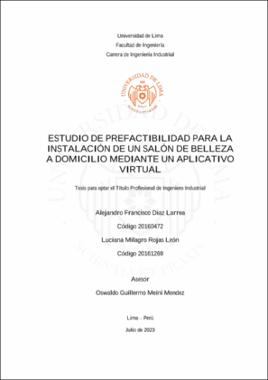| dc.contributor.advisor | Meini Mendez, Oswaldo Guillermo Arturo | |
| dc.contributor.author | Diaz Larrea, Alejandro Francisco | |
| dc.contributor.author | Rojas León, Luciana Milagro | |
| dc.date.accessioned | 2023-11-16T16:35:03Z | |
| dc.date.available | 2023-11-16T16:35:03Z | |
| dc.date.issued | 2023 | |
| dc.identifier.citation | Diaz Larrea, A. F. & Rojas León, L. M. (2023). Estudio de prefactibilidad para la instalación de un salón de belleza a domicilio mediante un aplicativo virtual [Tesis para optar el Título Profesional de Ingeniero Industrial, Universidad de Lima]. Repositorio institucional de la Universidad de Lima. https://hdl.handle.net/20.500.12724/19331 | es_PE |
| dc.identifier.uri | https://hdl.handle.net/20.500.12724/19331 | |
| dc.description.abstract | El presente trabajo tiene como objetivo evaluar la viabilidad de la implementación de un salón de belleza a domicilio mediante un aplicativo virtual. Para ello, se desarrollan a lo largo del estudio de prefactibilidad 8 capítulos que abordan temas relevantes para el caso.
En el primero, se explican los aspectos generales del estudio. Se detallan los objetivos de la investigación, la hipótesis, y se incluye un marco referencial y teórico.
En el segundo capítulo, se realiza un estudio de mercado para el proyecto, donde se analiza la oferta y la demanda del servicio y se lleva a cabo una encuesta al público objetivo, con el propósito de obtener la demanda del proyecto.
En el tercer capítulo, se analiza la localización del servicio, con el uso de la herramienta de ranking de factores.
En el cuarto capítulo, se calcula el dimensionamiento del servicio, evaluando los componentes de mercado, recursos, tecnología, punto de equilibrio e inversión.
En el quinto capítulo, se desarrolla la ingeniería del proyecto, en la cual se explican los procesos del servicio, y se calcula la capacidad de atención, el programa de operaciones, y se analiza la tecnología necesaria
En el sexto capítulo, se explica la organización de la parte administrativa del proyecto, tanto sus requerimientos como su esquema.
En el sétimo capítulo, se elabora un análisis económico y financiero para evaluar la viabilidad del proyecto, de acuerdo a los indicadores obtenidos.
Por último, se detallan las conclusiones obtenidas del estudio realizado, y se proponen recomendaciones para una posible mejora de este. | es_PE |
| dc.description.abstract | The present work aims to evaluate the feasibility of implementing a home beauty salon through a virtual application. To do this, 8 chapters are developed throughout the pre-feasibility study that address relevant issues for the case.
In the first chapter, the general aspects of the study are explained. The objectives of the investigation, the hypothesis, and a referential and theoretical framework are included.
In the second chapter, a market study is carried out for the project, where the supply and demand of the service is analyzed and a survey is carried out on the target audience, in order to obtain the demand for the project.
In the third chapter, the location of the service is analyzed, using the “ranking of factors” tool.
In the fourth chapter, the dimensioning of the service is calculated, evaluating the market components, resources, technology, balance point and investment.
In the fifth chapter, the engineering of the project is developed, in which the service processes are explained, and the service capacity and the operations program are calculated. Also, the technology that is needed for the project is analyzed.
In the sixth chapter, the organization of the administrative part of the project is explained, both its requirements and its scheme.
In the seventh chapter, an economic and financial analysis is prepared to evaluate the viability of the project, according to the indicators obtained.
Finally, the conclusions obtained from the study carried out are detailed, and recommendations are proposed for a possible improvement of the study. | es_PE |
| dc.format | application/pdf | |
| dc.language.iso | spa | |
| dc.publisher | Universidad de Lima | |
| dc.rights | info:eu-repo/semantics/openAccess | * |
| dc.rights.uri | https://creativecommons.org/licenses/by-nc-sa/4.0/ | * |
| dc.source | Repositorio Institucional - Ulima | |
| dc.source | Universidad de Lima | |
| dc.subject | Centros de estética | es_PE |
| dc.subject | Servicio al cliente | es_PE |
| dc.subject | Aplicaciones para móviles | es_PE |
| dc.subject | Estudios de prefactibilidad | es_PE |
| dc.subject | Beauty shops | en_EN |
| dc.subject | Customer services | en_EN |
| dc.subject | Mobile apps | en_EN |
| dc.subject | Prefeasibility studies | en_EN |
| dc.title | Estudio de prefactibilidad para la instalación de un salón de belleza a domicilio mediante un aplicativo virtual | es_PE |
| dc.title.alternative | Prefeasability study of the implementation of an at home beauty salon service through a mobile application | en_EN |
| dc.type | info:eu-repo/semantics/bachelorThesis | |
| thesis.degree.level | Título Profesional | |
| thesis.degree.discipline | Ingeniería Industrial | es_PE |
| thesis.degree.grantor | Universidad de Lima. Facultad de Ingeniería y Arquitectura | |
| dc.publisher.country | PE | |
| dc.type.other | Tesis | |
| thesis.degree.name | Ingeniero Industrial | |
| renati.advisor.orcid | https://orcid.org/0000-0002-2631-3270 | |
| renati.discipline | 722026 | |
| dc.identifier.isni | 121541816 | |
| renati.author.dni | 72185273 | |
| renati.author.dni | 72035783 | |
| renati.level | https://purl.org/pe-repo/renati/level#tituloProfesional | * |
| renati.advisor.dni | 7754715 | |
| renati.juror | Meza Ortiz, Richard Nicholas | |
| renati.juror | Montoya Barragán, Jorge Alfredo | |
| renati.juror | Tejeda Prada, Gino Julio | |
| renati.juror | Meini Mendez, Oswaldo Guillermo Arturo | |
| renati.type | https://purl.org/pe-repo/renati/type#tesis | * |
| dc.subject.ocde | https://purl.org/pe-repo/ocde/ford#2.11.04 | |
| ulima.cat | OI | |





